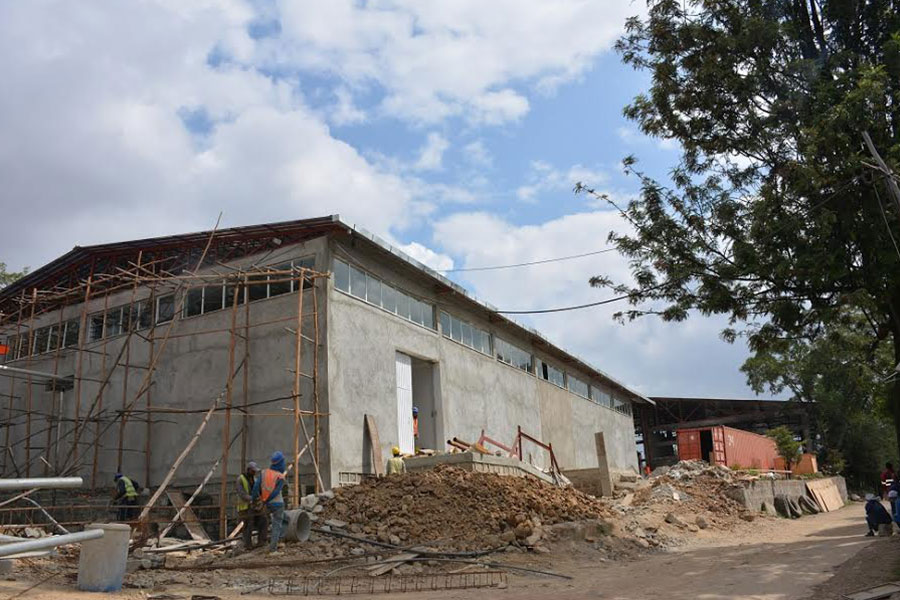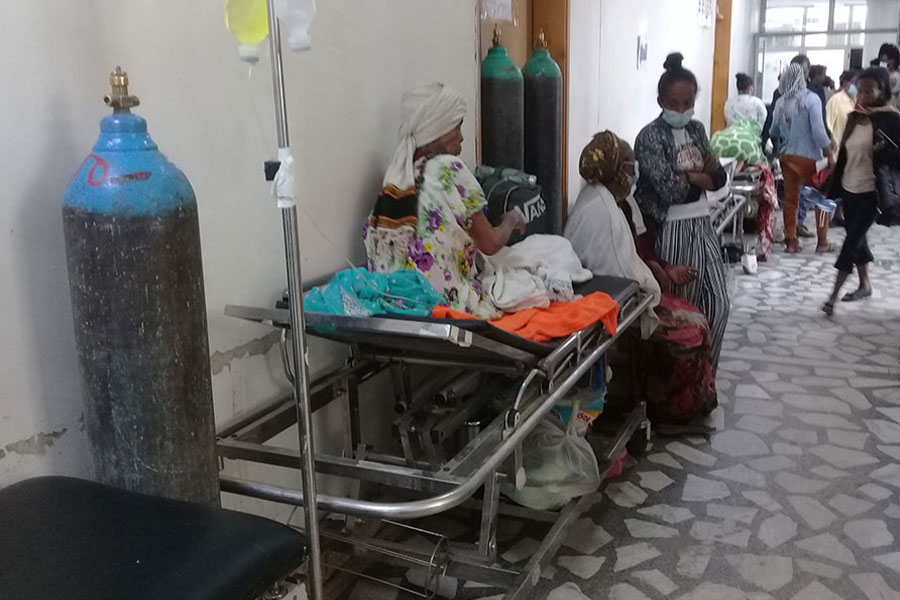
Covid-19 | Apr 17,2020
May 10 , 2025
By Ahmed T. Abdulkadir
When the first rays of sunlight hit Addis Abeba, they illuminate two very different realities.
In one, glass towers and sleek condos rise from the skyline, telltales to a city on the move. In the other, rows of tin-roofed homes huddle in narrow alleyways, their occupants stoking morning fires that send plumes of smoke into the air. The distant roar of bulldozers hints at yet another transformation of age-old neighbourhoods razed to make way for gated developments.
This city, home to more than five million people - if we go by the city's administration's data - and where 70pc of its inhabitants are under 35, was once a battleground over competing and conflicting revolutionary ideals. In 1975, the Derg regime nationalised all urban land, declaring it public property and determined to annihilate landholders. Decades later, that fateful decision has given way to a rigid leasehold system favouring those with little capital and vast connections.
Public land is parcelled out in opaque auctions and leased at rates beyond reach for most young Ethiopians. What was meant to ensure equitable access has instead turned into a speculative marketplace, where political ties can open doors that remain closed to the unconnected.
Rent consumes anywhere from 40pc to nearly 100pc of a young worker’s income in Addis Abeba. For a modest nine-square-meter shelter, a tenant may pay a monthly 5,000 Br and 10,000 Br, rentals that force many into informal arrangements or push them to the city’s periphery. The capital’s housing deficit now exceeds one million units, even as the construction sector grows at nearly nine percent annually and contributes 11pc of GDP.
However, this boom has done little to improve affordability for the majority.
Formal mortgage financing remains out of reach for most Ethiopians. More than half of home purchases rely on savings groups, family remittances or multiple jobs. Goh Betoch Bank, the country’s sole dedicated mortgage lender, is undercapitalised and overstretched. Fewer than one in four homes is backed by a mortgage, ensuring that housing remains a speculative asset detached from its social function.
Almost two decades ago, the federal government launched the Integrated Housing Development Program, a.k.a the Great Condo Initiative, to provide affordable housing for low- and middle-income families. In theory, the lottery-based system would allocate units at subsidised rates. In practice, units were often flipped four or five times their face value within months of allocation. Intermediaries and lottery winners alike profited, turning public housing into a windfall for the few.
Even those who secured a condominium often found themselves on the city's outskirts, facing long, costly commutes and limited access to schools or health clinics. Utility bills and transport expenses frequently eclipse the savings on rent, leading some residents to sublet their units or default on payments altogether.
The impact of Addis Abeba’s master plans and corridor developments manifested a recurring theme. When local voices are sidelined, the result is disruption rather than progress. In 2014, the city’s master plan sparked widespread protests when it failed to adequately consult residents of densely populated neighbourhoods like Lideta and Bole.
Expanding boulevards and shiny new districts often come at the expense of corner shops, social ties and the urban fabric that gives the city its character and soul. Amnesty International argued this year, that relocating communities without proper alternatives violated human rights standards. Ironically, similar patterns persist.
However, more inclusive approaches are possible.
Housing cooperatives can receive state-backed credit and legal protections, allowing residents to co-lease land and build collectively. Legislators can pass laws prohibiting evictions unless alternative housing is provided, offering a safeguard for vulnerable communities. These models demonstrate that state intervention and social equity can work in tandem. They have already imposed a levy on vacant houses, hoping to generate revenue for public housing.
Policymakers can refine the leasehold system to serve public interests, restructuring lease terms to favour longer tenures and more transparent allocation processes. Speculative resale could be capped to discourage immediate flips. Legal recognition of community land trusts could empower residents to safeguard their neighbourhoods and invest in incremental improvements without fear of eviction.
Strengthening public housing, especially in centrally located districts, would help bridge the gap between ambition and reality. Streamlining access to credit and expanding the capacity of institutions like Goh Betoch Bank could broaden mortgage availability. Microfinance schemes tailored to housing investments, coupled with technical support for self-building in informal settlements, could harness grassroots creativity.
In the shadow of the high-rises, the walls of informal dwellings bear witness to a land that was once declared public but now feels out of reach. Nonetheless, the story need not end there. By marrying state oversight with community-driven solutions, policymakers can craft a housing policy that honours its revolutionary origins while embracing the demands of a youthful population. The city that was not made for everyone can still become the home its people deserve.
PUBLISHED ON
May 10,2025 [ VOL
26 , NO
1306]

AhmedT. Abdulkadir (ahmedteyib.abdulkadir@addisfortune.net) is the Editor-in-Chief at Addis Fortune. With a critical eye on class dynamics, public policy, and the cultural undercurrents shaping Ethiopian society.

Covid-19 | Apr 17,2020

Commentaries | Apr 06,2024

Fortune News | Feb 09,2019

Editorial | Jun 07,2025

Commentaries | Sep 01,2024

Commentaries | Oct 24,2020

Radar | Mar 25,2023

Radar | Mar 11,2023

Commentaries | Sep 06,2025

Fortune News | Oct 06,2024

Photo Gallery | 180032 Views | May 06,2019

Photo Gallery | 170228 Views | Apr 26,2019

Photo Gallery | 161233 Views | Oct 06,2021

My Opinion | 137242 Views | Aug 14,2021

Dec 22 , 2024 . By TIZITA SHEWAFERAW
Charged with transforming colossal state-owned enterprises into modern and competitiv...

Aug 18 , 2024 . By AKSAH ITALO
Although predictable Yonas Zerihun's job in the ride-hailing service is not immune to...

Jul 28 , 2024 . By TIZITA SHEWAFERAW
Unhabitual, perhaps too many, Samuel Gebreyohannes, 38, used to occasionally enjoy a couple of beers at breakfast. However, he recently swit...

Jul 13 , 2024 . By AKSAH ITALO
Investors who rely on tractors, trucks, and field vehicles for commuting, transporting commodities, and f...

Nov 1 , 2025
The National Bank of Ethiopia (NBE) issued a statement two weeks ago that appeared to...

Oct 25 , 2025
The regulatory machinery is on overdrive. In only two years, no fewer than 35 new pro...

Oct 18 , 2025
The political establishment, notably the ruling party and its top brass, has become p...

Oct 11 , 2025
Ladislas Farago, a roving Associated Press (AP) correspondent, arrived in Ethiopia in...

Nov 2 , 2025
The National Bank of Ethiopia (NBE) has scrapped the credit-growth ceiling that had s...

Nov 2 , 2025 . By SURAFEL MULUGETA
The burgeoning data mining industry is struggling with mounting concerns following th...

Nov 2 , 2025 . By YITBAREK GETACHEW
Berhan Bank has chosen a different route in its pursuit of a new headquarters, opting for a transitional building instea...

Nov 2 , 2025 . By BEZAWIT HULUAGER
Nib International Bank S.C. has found itself at the epicentre of a severe governance...